Slavery in Islam
اسلام میں غلامی
Quran | Hadith | History | Reason
Muhammad Ahmad Zafar
13th November 2021
www.aagahi.com


How, Why & When Slavery Began?
“The origins of slavery are lost to human memory. It is sometimes hypothesized that at some moment it was decided that persons detained for a crime or as a result of warfare would be more useful if put to work in some way rather than if killed outright and discarded or eaten. But both if and when that first occurred is unknown.”
[Encyclopaedia Britannica, Slavery]
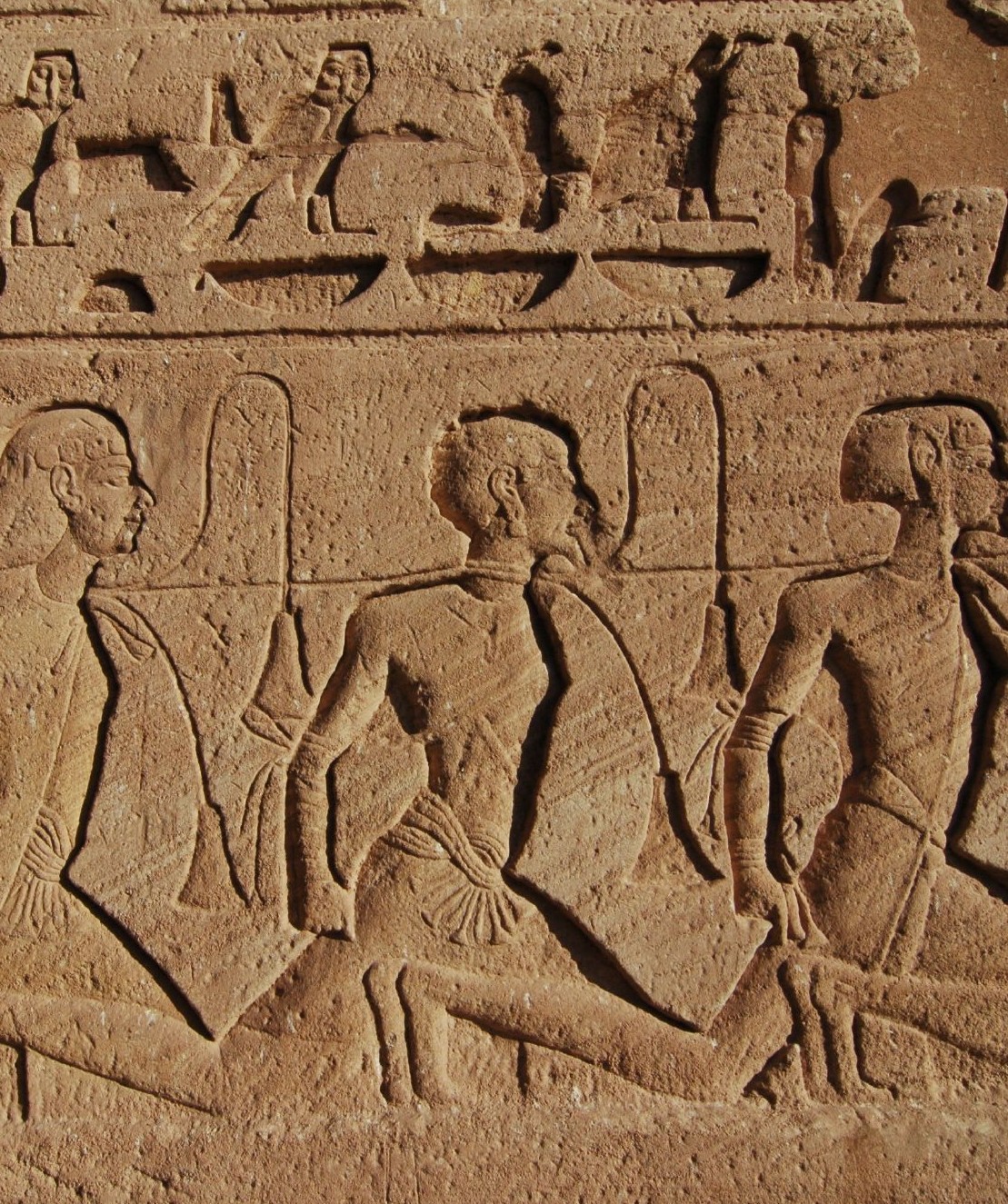
“In Babylonia and the world of the Old Testament, however, the single greatest reason for enslavement was debt or poverty, including the indigent selling themselves or their kin into slavery to improve their lot. This phenomenon was common from Western Europe to Southeast Asia for centuries.”
[Slavery & Islam by Jonathan A.C. Brown, Page 180]
“When Noah awoke ... he said, ‘Cursed be Canaan! The lowest of slaves will he be to his brothers.’”
[The Old Testament, Book of Genesis, 9:24-25]
Slavery under the Roman Empire
“... at the height of its power the Roman Empire required 250,000 - 400,000 new slaves each year to maintain the slave population.”
“It was the sale of slaves that paid for the imports that began to flood into Europe in the ninth century.”
[The Silk Roads by Peter Frankopan, Page 116 & 118]
“Slaves were the lowest class of society and even freed criminals had more rights. Slaves had no rights at all ... could not create relations or families, nor could they own property.”
[https://www.worldhistory.org/article/629/slavery-in-the-roman-world/]
Vikings & the Rus’
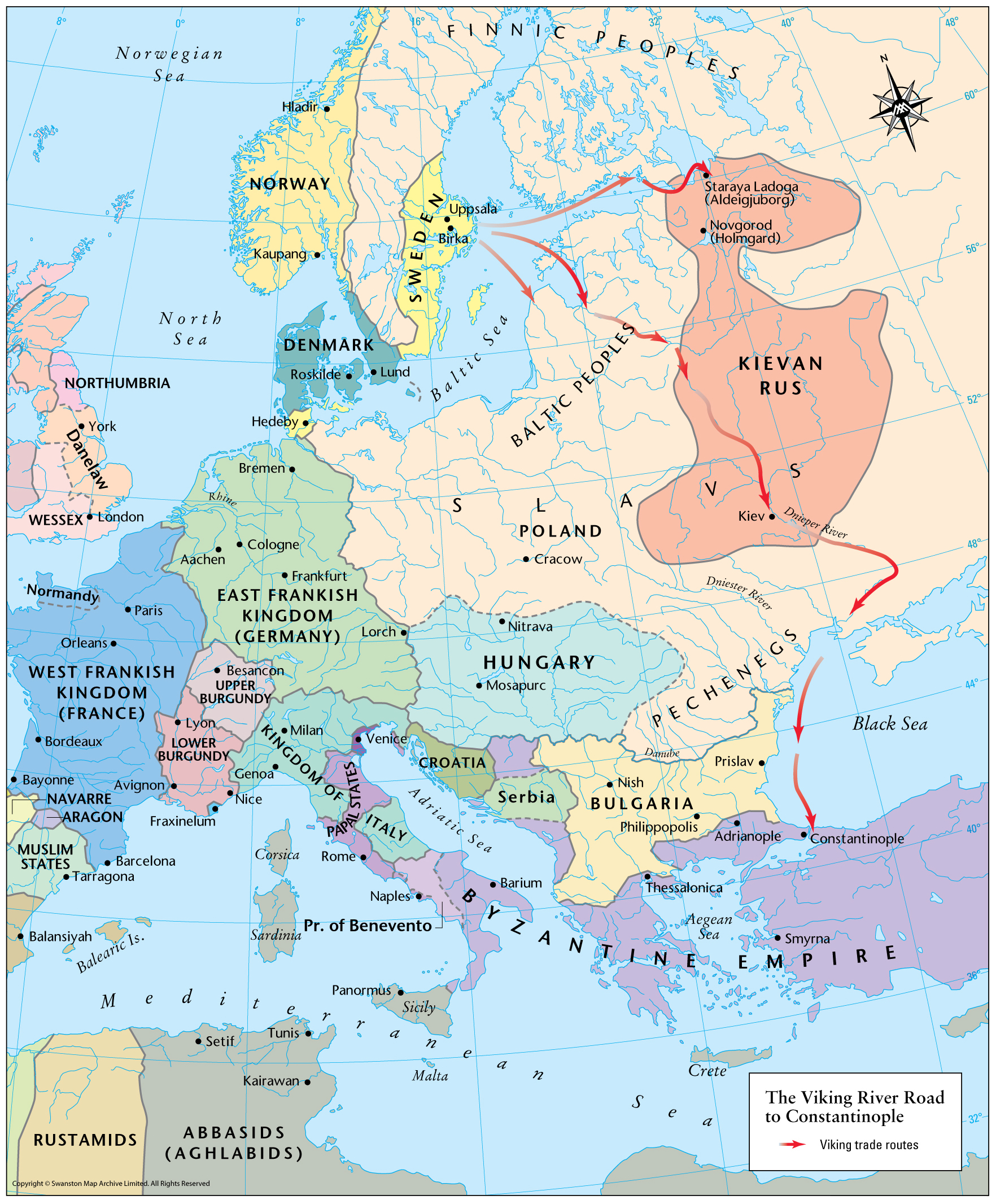
“In the east, they (Vikings) were to found a new state, named after the traders, travellers and raiders who took to the great water systems linking the Baltic with the Caspian and Black Seas. These men were known as Rus’, or rhos, perhaps due to their distinctive red hair, or more likely thanks to their prowess with the roar. They were the fathers of Russia.”
[The Silk Roads by Peter Frankopan, Page 111]
The Vikings & the Rus’
“The Rus’ were ruthless when it came to enslaving local populations and transporting them south ... So many were captured that the very name of those taken captive - Slavs - became used for all those who had their freedom taken away: slaves ... Beautiful women were particularly highly prized, sold on to merchants in Khazaria and Volga Bulgharia who would then take them further south - though not before their captors had sexual intercourse with them one last time ... Slavery was a vital part of Viking society and an important part of its economy ...”
[The Silk Roads by Peter Frankopan, Page 114]
Slavery Laws Before Islam (1)
“During the period of the Roman Republic (6th-1st centuries BCE), there was no legal constraint on a master's treatment of his slaves. In Ming China (1368-1644 CE), slaves were often referred to as ‘not humans’. Not only could they not own property, marry or have legitimate children, killing one of them posed no legal problem. Among the Toraja people of Sulewesi (today in Indonesia), someone who had been convicted of a capital crime could have one of his slaves executed instead of himself.”
[Slavery & Islam by Jonathan A.C. Brown, Page 40]
Slavery Laws Before Islam (2)
“Children born out of wedlock became state slaves on the fringes of West Sumatra ...”
[Islam & the Abolition of Slavery by William G.C. Smith, Page 79]
“In nineteenth-century China, it was common for women to be sold by their families to wealthier families ... women involved often consented in order to alleviate their own or their families’ poverty.”
[Slavery & Islam by Jonathan A.C. Brown, Page 56]
Slavery Laws Before Islam (3)
“... from the Roman through the medieval period in Europe parents could and did sell their children off as slaves to creditors in order to pay debts. This was also common in India into the nineteenth century as well as in Southeast Asia. Moreover, poor parents abandoning unwanted children was a regular source for slave markets in medieval Europe.”
[Slavery & Islam by Jonathan A.C. Brown, Page 41]
“... hierarchies of power (i.e., the caste system). Several complex systems of slavery were features of social and economic life in India from the Vedic period (circa 1500-500 BCE).”
[Slavery & Islam by Jonathan A.C. Brown, Page 161]
Slavery in World Religions Before Islam (1)
“When you march up to attack a city, make its people an offer of peace. If they accept and open their gates, all the people in it shall be subject to forced labor and shall work for you. If they refuse to make peace ... put to the sword all the men in it. As for the women, the children, the livestock and everything else in the city, you may take these as plunder for yourselves ... This is how you are to treat all the cities that are at a distance from you and do not belong to the nations nearby. However, in the cities of the nations the Lord your God is giving you as an inheritance, do not leave alive anything that breathes.”
[The Old Testament, Book of Deuteronomy, 20:10-16]
Slavery in World Religions Before Islam (2)
“Your male and female slaves are to come from the nations around you; from them you may buy slaves.”
[The Old Testament, Book of Leviticus, 20:44]
“The roots of slavery stretched back to the earliest Hindu texts, and belief in reincarnation ... as retribution for bad deeds ... Buddhism inherited slavery from Hinduism, while marginalising or rejecting caste ... The Buddha forbade his followers from making a living out of dealing in slaves ...”
[Islam & the Abolition of Slavery by William G.C. Smith, Page 230]
How Muhammad ﷺ treated his Slave
“Captured during a battle, he had been sold several times before becoming Khadijah’s slave ... his father and uncle decided to leave for Makkah immediately to find Zayd and bring him back to his tribe ... Muhammad in turn suggested they should let Zayd choose for himself: if he decided to go back ... Muhammad would let him go without asking for any compensation, but if on the contrary Zayd wanted to stay with his master, his relatives would have to accept his choice ... He decided to stay ...”
[In the Footsteps of the Prophet by Tariq Ramadan, Page 24]
Quran on Treatment with POWs (1)
فَإِذَا لَقِيتُمُ الَّذِينَ كَفَرُوا فَضَرْبَ الرِّقَابِ حَتَّىٰ إِذَا أَثْخَنتُمُوهُمْ فَشُدُّوا الْوَثَاقَ فَإِمَّا مَنًّا بَعْدُ وَإِمَّا فِدَاءً حَتَّىٰ تَضَعَ الْحَرْبُ أَوْزَارَهَا ۚ ذَٰلِكَ وَلَوْ يَشَاءُ اللَّهُ لَانتَصَرَ مِنْهُمْ وَلَٰكِن لِّيَبْلُوَ بَعْضَكُم بِبَعْضٍ ۗ وَالَّذِينَ قُتِلُوا فِي سَبِيلِ اللَّهِ فَلَن يُضِلَّ أَعْمَالَهُمْ ۞
“So when you meet those who disbelieve [in battle], strike [their] necks until, when you have inflicted slaughter upon them, then secure their bonds, and either [confer] favour afterwards or ransom [them] until the war lays down its burdens. That [is the command]. And if Allah had willed, He could have taken vengeance upon them [Himself], but to test some of you by means of others. And those who are killed in the cause of Allah - never will He waste their deeds.”
[Surah Muhammad (47): Ayat 4]
Quran on Treatment with POWs (2)
مَا كَانَ لِنَبِيٍّ أَن يَكُونَ لَهُ أَسْرَىٰ حَتَّىٰ يُثْخِنَ فِي الْأَرْضِ ۚ تُرِيدُونَ عَرَضَ الدُّنْيَا وَاللَّهُ يُرِيدُ الْآخِرَةَ ۗ وَاللَّهُ عَزِيزٌ حَكِيمٌ ۞ لَّوْلَا كِتَابٌ مِّنَ اللَّهِ سَبَقَ لَمَسَّكُمْ فِيمَا أَخَذْتُمْ عَذَابٌ عَظِيمٌ ۞
“It is not for a prophet to have captives [of war] until he inflicts a massacre [upon Allah’s enemies] in the land. Some Muslims desire the commodities of this world, but Allah desires [for you] the Hereafter. And Allah is Exalted in Might and Wise. If not for a decree from Allah that preceded, you would have been touched for what you took by a great punishment.”
[Surah Al-Anfal (8): Ayat 67-68]
Wisdom Behind Enslavement After Wars
عَنْ أَبِي هُرَيْرَةَ ـ رضى الله عنه ـ عَنِ النَّبِيِّ صلى الله عليه وسلم قَالَ « عَجِبَ اللَّهُ مِنْ قَوْمٍ يَدْخُلُونَ الْجَنَّةَ فِي السَّلاَسِلِ »
Narrated from Abu Hurairah that the Prophet (s.a.w) said, “Allah wonders at those people who will enter Paradise in chains.”
[Sahih Bukhari, Kitab Al-Jihad (56), Hadith 3010]
“... servitude gave a person a chance to learn about Islam.”
[Islam & the Abolition of Slavery by William G.C. Smith, Page 131]
Provision to Marry a Slave
حُرِّمَتْ عَلَيْكُمْ … ۞ وَالْمُحْصَنَاتُ مِنَ النِّسَاءِ إِلَّا مَا مَلَكَتْ أَيْمَانُكُمْ ۖ كِتَابَ اللَّهِ عَلَيْكُمْ ۚ وَأُحِلَّ لَكُم مَّا وَرَاءَ ذَٰلِكُمْ ... إِنَّ اللَّهَ كَانَ عَلِيمًا حَكِيمًا ۞ وَمَن لَّمْ يَسْتَطِعْ مِنكُمْ طَوْلًا أَن يَنكِحَ الْمُحْصَنَاتِ الْمُؤْمِنَاتِ فَمِن مَّا مَلَكَتْ أَيْمَانُكُم مِّن فَتَيَاتِكُمُ الْمُؤْمِنَاتِ ... فَانكِحُوهُنَّ بِإِذْنِ أَهْلِهِنَّ وَآتُوهُنَّ أُجُورَهُنَّ بِالْمَعْرُوفِ مُحْصَنَاتٍ غَيْرَ مُسَافِحَاتٍ وَلَا مُتَّخِذَاتِ أَخْدَانٍ ... ۞
[Surah Al-Nisa (4): Ayat 23-25]
The Wait Period for a Slave Woman
عَنِ ابْنِ عُمَرَ، قَالَ قَالَ رَسُولُ اللَّهِ ـ صلى الله عليه وسلم ـ « طَلاَقُ الأَمَةِ اثْنَتَانِ وَعِدَّتُهَا حَيْضَتَانِ »
Narrated by Ibn Umar (r.a.) that the Messenger of Allah (s.a.w) said, “The divorce of a slave woman is twice, and her waiting period is two menstrual cycles.”
[Ibn Majah, Kitab At-Talaq (10), Hadith 2079] (Daif)
If a Slave Woman Commits Adultery
... فَإِذَا أُحْصِنَّ فَإِنْ أَتَيْنَ بِفَاحِشَةٍ فَعَلَيْهِنَّ نِصْفُ مَا عَلَى الْمُحْصَنَاتِ مِنَ الْعَذَابِ ۚ ذَٰلِكَ لِمَنْ خَشِيَ الْعَنَتَ مِنكُمْ ۚ وَأَن تَصْبِرُوا خَيْرٌ لَّكُمْ ۗ وَاللَّهُ غَفُورٌ رَّحِيمٌ ۞
“... But once they are sheltered in marriage, if they should commit adultery, then for them is half the punishment for free [unmarried] women. This [allowance] is for him among you who fears sin, but to be patient is better for you. And Allah is Forgiving and Merciful.”
[Surah Al-Nisa (4): Ayat 25]
Woman who had Relations with Slave
“A woman allowed her slave to have his way with her, and when she was told off, she said, ‘Doesn’t Allah say, “Those [slaves] whom your hands possess?” And this is one whom my right hand possesses.’ The matter was referred to Umar and he said to her, ‘The one whom your right hand possesses is not permissible for you.’ ... Umar waived the hadd punishment in her case because she was ignorant of the prohibition.”
[Umar ibn Al-Khattab by Ali Muhammad As-Sallabi, Vol 1, Page 524-525]
Manumission - Expiation from Sins (1)
وَمَا كَانَ لِمُؤْمِنٍ أَن يَقْتُلَ مُؤْمِنًا إِلَّا خَطَأً ۚ وَمَن قَتَلَ مُؤْمِنًا خَطَأً فَتَحْرِيرُ رَقَبَةٍ مُّؤْمِنَةٍ وَدِيَةٌ مُّسَلَّمَةٌ إِلَىٰ أَهْلِهِ إِلَّا أَن يَصَّدَّقُوا ... ۞
“And never is it for a believer to kill a believer except by mistake. And whoever kills a believer by mistake - then the freeing of a believing slave and a compensation payment presented to the deceased's family [is required] unless they give [up their right as] charity ...”
[Surah Al-Nisa (4): Ayat 92]
Manumission - Expiation from Sins (2)
لَا يُؤَاخِذُكُمُ اللَّهُ بِاللَّغْوِ فِي أَيْمَانِكُمْ وَلَٰكِن يُؤَاخِذُكُم بِمَا عَقَّدتُّمُ الْأَيْمَانَ ۖ فَكَفَّارَتُهُ إِطْعَامُ عَشَرَةِ مَسَاكِينَ مِنْ أَوْسَطِ مَا تُطْعِمُونَ أَهْلِيكُمْ أَوْ كِسْوَتُهُمْ أَوْ تَحْرِيرُ رَقَبَةٍ ۖ فَمَن لَّمْ يَجِدْ فَصِيَامُ ثَلَاثَةِ أَيَّامٍ ۚ ذَٰلِكَ كَفَّارَةُ أَيْمَانِكُمْ إِذَا حَلَفْتُمْ ... ۞
“Allah will not impose blame upon you for what is meaningless in your oaths, but He will impose blame upon you for [breaking] what you intended of oaths. So its expiation is the feeding of ten needy people from the average of that which you feed your [own] families or clothing them or the freeing of a slave. But whoever cannot find [or afford it] - then a fast of three days [is required]. That is the expiation for oaths when you have sworn ...”
[Surah Al-Maida (5): Ayat 89]
Manumission - Expiation from Sins (3)
وَالَّذِينَ يُظَاهِرُونَ مِن نِّسَائِهِمْ ثُمَّ يَعُودُونَ لِمَا قَالُوا فَتَحْرِيرُ رَقَبَةٍ مِّن قَبْلِ أَن يَتَمَاسَّا ۚ ذَٰلِكُمْ تُوعَظُونَ بِهِ ۚ وَاللَّهُ بِمَا تَعْمَلُونَ خَبِيرٌ ۞
“And those who pronounce thihar from their wives and then [wish to] go back on what they said - then [there must be] the freeing of a slave before they touch one another. That is what you are admonished thereby; and Allah is Acquainted with what you do.”
[Surah Al-Mujadila (58): Ayat 3]
Manumission - Expiation from Sins (4)
عَنْ أَبِي هُرَيْرَةَ ـ رضى الله عنه ـ جَاءَ رَجُلٌ إِلَى النَّبِيِّ صلى الله عليه وسلم فَقَالَ إِنَّ الأَخِرَ وَقَعَ عَلَى امْرَأَتِهِ فِي رَمَضَانَ. فَقَالَ « أَتَجِدُ مَا تُحَرِّرُ رَقَبَةً » ...
Narrated by Abu Hurairah (r.a), A man came to the Prophet (s.a.w) and said, “I had sexual intercourse with my wife in Ramadan (while fasting).” The Prophet (s.a.w) asked him, “Can you afford to manumit a slave?” ...
[Sahih Bukhari, Kitab As-Saum (30), Hadith 1937]
Manumission - During Testing Times
عَنْ أَسْمَاءَ بِنْتِ أَبِي بَكْرٍ ـ رضى الله عنهما ـ قَالَتْ أَمَرَ النَّبِيُّ صلى الله عليه وسلم بِالْعَتَاقَةِ فِي كُسُوفِ الشَّمْسِ
Narrated by Asma that the Prophet ordered us to free slaves during the solar eclipses.
[Sahih Bukhari, Kitab Al-Itiq (49), Hadith 2519]
عَنْ أَسْمَاءَ بِنْتِ أَبِي بَكْرٍ ـ رضى الله عنهما ـ قَالَتْ كُنَّا نُؤْمَرُ عِنْدَ الْخُسُوفِ بِالْعَتَاقَةِ
Narrated by Asma that we were ordered to free slaves at the time of lunar eclipses.
[Sahih Bukhari, Kitab Al-Itiq (49), Hadith 2520]
Zakat - A Fundamental Pillars of Islam
إِنَّمَا الصَّدَقَاتُ لِلْفُقَرَاءِ وَالْمَسَاكِينِ وَالْعَامِلِينَ عَلَيْهَا وَالْمُؤَلَّفَةِ قُلُوبُهُمْ وَفِي الرِّقَابِ وَالْغَارِمِينَ وَفِي سَبِيلِ اللَّهِ وَابْنِ السَّبِيلِ ۖ فَرِيضَةً مِّنَ اللَّهِ ۗ وَاللَّهُ عَلِيمٌ حَكِيمٌ ۞
“The alms are only for the poor and the needy, and those who collect them, and those whose hearts are to be reconciled, and to free the captives and the debtors, and for the cause of Allah, and (for) the wayfarer; a duty imposed by Allah. Allah is Knower, Wise.”
[Surah At-Tawba (9): Ayat 60]
The Promise of a Double Reward
عَنْ أَبِي مُوسَى الأَشْعَرِيِّ قَالَ قَالَ رَسُولُ اللَّهِ « إِذَا أَدَّبَ الرَّجُلُ أَمَتَهُ فَأَحْسَنَ تَأْدِيبَهَا، وَعَلَّمَهَا فَأَحْسَنَ تَعْلِيمَهَا ثُمَّ أَعْتَقَهَا فَتَزَوَّجَهَا، كَانَ لَهُ أَجْرَانِ، وَإِذَا آمَنَ بِعِيسَى ثُمَّ آمَنَ بِي، فَلَهُ أَجْرَانِ، وَالْعَبْدُ إِذَا اتَّقَى رَبَّهُ وَأَطَاعَ مَوَالِيَهُ، فَلَهُ أَجْرَانِ »
Narrated from Abu Musa Al-Ashari (r.a) that the Messenger of Allah (s.a.w) said, “If a person teaches his slave girl good manners properly, educates her properly, and then manumits and marries her, he will get a double reward. And if a man believes in Jesus and then believes in me, he will get a double reward. And if a slave fears his Lord and obeys his masters, he too will get a double reward.”
[Sahih Bukhari, Kitab Ahadith Al-Anbiya (60), Hadith 3446]
The Christian Slave of Umar ibn Al-Khattab
“Umar had a Christian slave whose name was Ashaqq. He said, ‘I was a Christian slave belonging to Umar.’ He (Umar) said, ‘Become Muslim so that we may benefit from your help with regard to some of the Muslims’ affairs, because we should not seek help in dealing with their affairs from someone who is not one of them.’ But I refused, and he said, ‘There is no compulsion in religion’ When Umar was dying, he set me free and said, ‘Go wherever you want.’”
[Umar ibn Al-Khattab by Ali Muhammad As-Sallabi, Vol 1, Page 203]
Scholars & Saints from Slave Background
Rabia Al-Basri (717-801)
Hasan Basri (d. 728) and Ibn Sirin (d. 728), who were sons of freed slave father ...
Sinan, the architect
'Ikrima (d. 723-4)
Muhammad Ibn Ishaq (d. 767), a leading jurist and Hadith transmitter as well as the author of the earliest full biography of the Prophet.
Hadith on Separating a Mother and Child
عَنْ أَبِي أَيُّوبَ، قَالَ سَمِعْتُ رَسُولَ اللَّهِ صلى الله عليه وسلم يَقُولُ « مَنْ فَرَّقَ بَيْنَ الْوَالِدَةِ وَوَلَدِهَا فَرَّقَ اللَّهُ بَيْنَهُ وَبَيْنَ أَحِبَّتِهِ يَوْمَ الْقِيَامَةِ »
Narrated by Abu Ayyub, that he heard the Messenger of Allah (s.a.w) say, “Whoever seperates a mother from her child, Allah seperates him and his most beloved on the Day of Judgement.”
[Tirmidi, Kitab Al-Bayoou (14), 1283] (Hasan)
“... When news of her plight reached their kings, they told her, ‘He is compassionate. We give you permission to go to him, so go and ask him and he will give back to you.’ ... So she went out and asked the Muslim scouts for help, telling them about the situation. They took her to the Sultan ... she wept greatly ... his eyes overflowed with tears ...”
[Salah ad-Deen al-Ayubi, Vol 3, Page 184-185]
Salahuddin Ayyubi
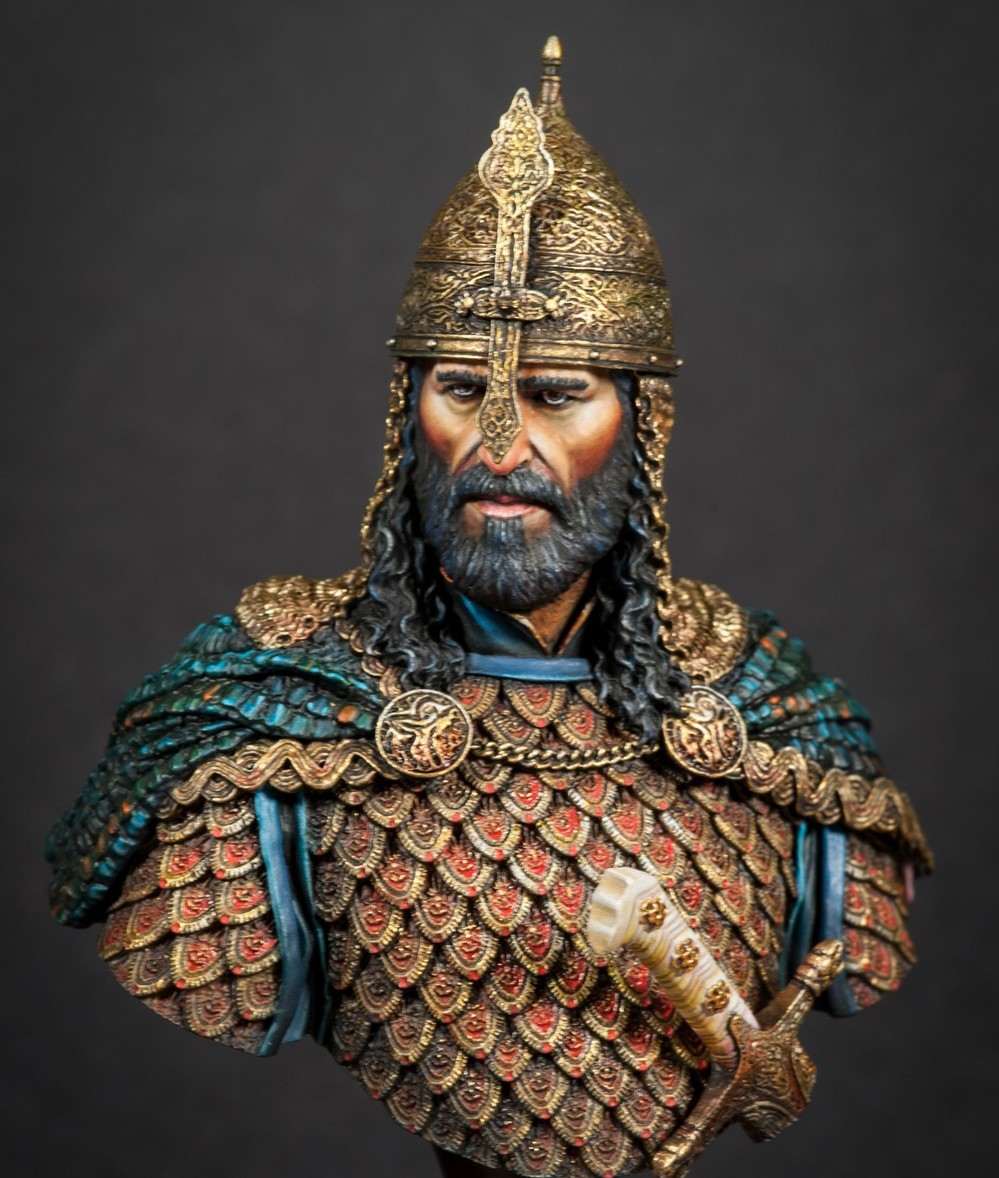
Hadith on Separating Young Slaves
عَنْ عَلِيٍّ، رَضِيَ اللَّهُ عَنْهُ قَالَ وَهَبَ لِي رَسُولُ اللَّهِ صَلَّى اللَّهُ عَلَيْهِ وَسَلَّمَ غُلَامَيْنِ أَخَوَيْنِ فَبِعْتُ أَحَدَهُمَا فَقَالَ رَسُولُ اللَّهِ صَلَّى اللَّهُ عَلَيْهِ وَسَلَّمَ مَا فَعَلَ الْغُلَامَانِ فَقُلْتُ بِعْتُ أَحَدَهُمَا فَقَالَ رَسُولُ اللَّهِ صَلَّى اللَّهُ عَلَيْهِ وَسَلَّمَ رُدَّهُ
“Narrated by Ali (r.a) that the Messenger of Allah (s.a.w) gave me two slaves who were brothers, and I sold one of them. The Messenger of Allah (s.a.w) asked, ‘What happened to the two slaves?’ I said, ‘I have sold one of them.’ The Messenger of Allah (s.a.w) said, ‘Get him back.’”
[Musnad Ahmad, 800] (Hasan li-Ghairihi)
Respect & Honour for the Slave (1)
عَنِ النَّبِيِّ صلى الله عليه وسلم أَنَّهُ قَالَ « لاَ يَقُلْ أَحَدُكُمْ أَطْعِمْ رَبَّكَ، وَضِّئْ رَبَّكَ، اسْقِ رَبَّكَ. وَلْيَقُلْ سَيِّدِي مَوْلاَىَ. وَلاَ يَقُلْ أَحَدُكُمْ عَبْدِي أَمَتِي. وَلْيَقُلْ فَتَاىَ وَفَتَاتِي وَغُلاَمِي »
The Prophet (s.a.w) said, “You should not say, ‘Feed your lord’, ‘help your lord in performing ablution’, or ‘give water to your lord’, but should say, ‘my master’, or ‘my guardian’, and one should not say, ‘my slave’, or ‘my girl-slave’, but should say, ‘my lad’, ‘my girl’, and ‘my boy’.”
[Sahih Bukhari, Kitab Al-Itiq (49), Hadith 2552]
Respect & Honour for the Slave (2)
عَنِ الْمَعْرُورِ ... « ... إِخْوَانُكُمْ خَوَلُكُمْ، جَعَلَهُمُ اللَّهُ تَحْتَ أَيْدِيكُمْ، فَمَنْ كَانَ أَخُوهُ تَحْتَ يَدِهِ فَلْيُطْعِمْهُ مِمَّا يَأْكُلُ، وَلْيُلْبِسْهُ مِمَّا يَلْبَسُ، وَلاَ تُكَلِّفُوهُمْ مَا يَغْلِبُهُمْ، فَإِنْ كَلَّفْتُمُوهُمْ فَأَعِينُوهُمْ »
Narrated by Al-Marur (r.a) ... “... ‘(Your slaves) are your brothers and Allah has put them under your command. So whoever has a brother under his command should feed him of what he eats and dress him of what he wears. Do not ask them to do things beyond their capacity and if you do so, then help them.’”
[Sahih Bukhari, Kitab Al-Emaan (2), Hadith 30]
Respect & Honour for the Slave (3)
عَنْ أَبِي هُرَيْرَةَ، قَالَ: قَالَ رَسُولُ اللهِ صَلَّى اللَّهُ عَلَيْهِ وَسَلَّمَ: « الْمَمْلُوكُ أَخُوكَ، فَإِذَا صَنَعَ لَكَ طَعَامًا فَأَجْلِسْهُ مَعَكَ، فَإِنْ أَبَى فَأَطْعِمْهُ، وَلَا تَضْرِبُوا وُجُوهَهُمْ »
Narrated by Abu Hurairah (r.a) that the Messenger of Allah (s.a.w) said, “Your slaves are your brothers. When your slaves brings your meals to you then let them sit with you. If they do not sit, then give them something from the meal and never hit them on their faces.”
[Al-Bayhaqi, Shuab-ul-Iman, Hadith 8206] (Sahih)
Killing, Mutilating or Harming a Slave
عَنْ سَمُرَةَ، أَنَّ رَسُولَ اللَّهِ صلى الله عليه وسلم قَالَ « مَنْ قَتَلَ عَبْدَهُ قَتَلْنَاهُ وَمَنْ جَدَعَهُ جَدَعْنَاهُ وَمَنْ أَخْصَاهُ أَخْصَيْنَاهُ »
Narrated by Samurah that the Messenger of Allah (s.a.w) said, “Whoever kills his slave, we will kill him. Whoever mutilates (his slave), we will mutilate him, and whoever castrates (his slave), we will castrate him.”
[Sunan Nasai, Kitab Al-Qasamah (45), 4736] (Hasan)
Reward for Freeing a Slave
سَعِيدٌ ابْنُ مَرْجَانَةَ، صَاحِبُ عَلِيِّ بْنِ حُسَيْنٍ قَالَ لِي أَبُو هُرَيْرَةَ قَالَ النَّبِيُّ صلى الله عليه وسلم « أَيُّمَا رَجُلٍ أَعْتَقَ امْرَأً مُسْلِمًا اسْتَنْقَذَ اللَّهُ بِكُلِّ عُضْوٍ مِنْهُ عُضْوًا مِنْهُ مِنَ النَّارِ ». قَالَ سَعِيدٌ ابْنُ مَرْجَانَةَ فَانْطَلَقْتُ إِلَى عَلِيِّ بْنِ حُسَيْنٍ فَعَمَدَ عَلِيُّ بْنُ حُسَيْنٍ ـ رضى الله عنهما ـ إِلَى عَبْدٍ لَهُ قَدْ أَعْطَاهُ بِهِ عَبْدُ اللَّهِ بْنُ جَعْفَرٍ عَشَرَةَ آلاَفِ دِرْهَمٍ ـ أَوْ أَلْفَ دِينَارٍ ـ فَأَعْتَقَهُ
[Sahih Bukhari, Kitab Al-Itiq (49), Hadith 2517]
Freeing a Slave at the Time of Death
عَنْ أَبِي حَبِيبَةَ الطَّائِيِّ، قَالَ ... سَمِعْتُ رَسُولَ اللَّهِ صلى الله عليه وسلم يَقُولُ « مَثَلُ الَّذِي يُعْتِقُ عِنْدَ الْمَوْتِ كَمَثَلِ الَّذِي يُهْدِي إِذَا شَبِعَ »
Narrated by Abu Habibah At-Ta'i ... I heard the Messenger of Allah (s.a.w) said, “The parable of the one who frees a slave at the time of his death is that of the one who gives a gift when he is satisfied (fulfilled his needs).”
[Tirmidi, Kitab Al-Wasaya (30), 2123] (Hasan)
Expiation for Slapping a Slave
رَسُولَ اللَّهِ -صلى الله عليه وسلم- يَقُولُ « مَنْ ضَرَبَ غُلاَمًا لَهُ حَدًّا لَمْ يَأْتِهِ أَوْ لَطَمَهُ فَإِنَّ كَفَّارَتَهُ أَنْ يُعْتِقَهُ »
The Messenger of Allah (s.a.w) said, “Whoever beats a slave without him having done anything to deserve it, or slaps him, his expiation is to manumit him.”
[Sahih Muslim, Kitab Al-Aimaan (27), Hadith 4299]
Quran on Emancipation (Mukataba)
... وَالَّذِينَ يَبْتَغُونَ الْكِتَابَ مِمَّا مَلَكَتْ أَيْمَانُكُمْ فَكَاتِبُوهُمْ إِنْ عَلِمْتُمْ فِيهِمْ خَيْرًا ۖ وَآتُوهُم مِّن مَّالِ اللَّهِ الَّذِي آتَاكُمْ ۚ وَلَا تُكْرِهُوا فَتَيَاتِكُمْ عَلَى الْبِغَاءِ إِنْ أَرَدْنَ تَحَصُّنًا لِّتَبْتَغُوا عَرَضَ الْحَيَاةِ الدُّنْيَا ۚ وَمَن يُكْرِههُّنَّ فَإِنَّ اللَّهَ مِن بَعْدِ إِكْرَاهِهِنَّ غَفُورٌ رَّحِيمٌ ۞
“... And those who seek a contract [for eventual emancipation] from among whom your right hands possess - then make a contract with them if you know there is within them goodness and give them from the wealth of Allah which He has given you. And do not compel your slave girls to prostitution, if they desire chastity, to seek [thereby] the temporary interests of worldly life. And if someone should compel them, then indeed, Allah is [to them], after their compulsion, Forgiving and Merciful.”
[Surah Al-Noor (24): Ayat 33]
A Slave can Even Become the Ruler
عَنْ أَنَسِ بْنِ مَالِكٍ ـ رضى الله عنه ـ قَالَ قَالَ رَسُولُ اللَّهِ صلى الله عليه وسلم « اسْمَعُوا وَأَطِيعُوا وَإِنِ اسْتُعْمِلَ عَلَيْكُمْ عَبْدٌ حَبَشِيٌّ كَأَنَّ رَأْسَهُ زَبِيبَةٌ »
Narrated from Anas bin Malik (r.a) that the Messenger of Allah (s.a.w) said, “You should listen to and obey, your ruler even if he was an abyssinian (black) slave whose head looks like a raisin.”
[Sahih Bukhari, Kitab Al-Ahkam (93), Hadith 7142]
Divine Revelation to Abolish Slavery?
عَنْ عَائِشَةَ، قَالَتْ: قَالَ رَسُولُ اللهِ صَلَّى اللَّهُ عَلَيْهِ وَسَلَّمَ « مَا زَالَ جِبْرِيلُ يُوصِينِي بِالْجَارِ حَتَّى ظَنَنْتُ أَنَّهُ يُوَرِّثُهُ، وَمَا زَالَ يُوصِينِي بِالْمَمْلُوكِ حَتَّى ظَنَنْتُ أَنَّهُ يَضْرِبُ لَهُ أَجَلًا أَوْ وَقْتًا إِذَا بَلَغَهُ أُعْتِقَ »
Aisha (r.a) said that the Messenger of Allah (s.a.w) said, “Jibreel continued to advise me to treat neighbours well until I thought they would be made the heirs, and continued to advise me to treat slaves well until I thought they would all be freed at a certain time.”
[Al-Bayhaqi, Shuab-ul-Iman, Hadith 8194] (Sahih/Daif)
Muqawqis - Egyptian Leader in Alexandria
Hatib ibn Abi Baltah (r.a) was sent to Egypt after the Treaty of Hudaybiyah.
Muqawqis did not accept Islam but sent gifts for the Prophet (s.a.w) including Mariyah, her sister Sireen and an Eunuch named Maboor.
She accepted Islam and after the birth of Ibrahim, she was set free.
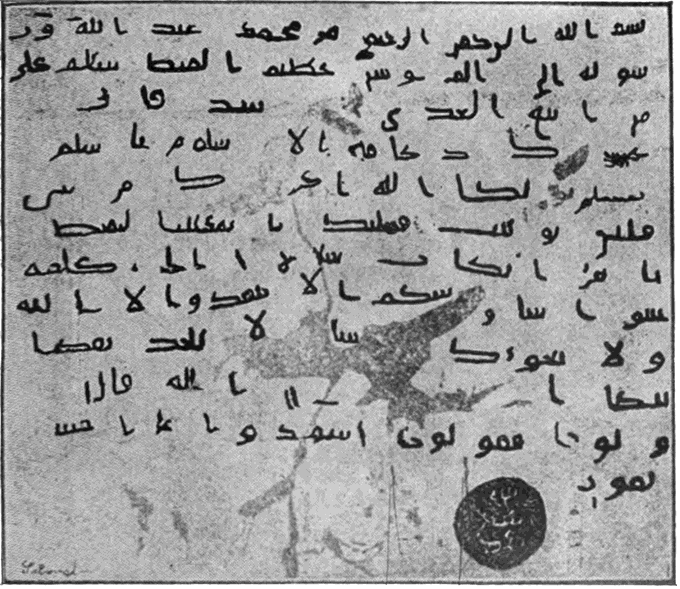
Initially lived in the chambers but later shifted to Aliyah, in the outskirts of Madina. She passed away in the year 17AH and was buried in Baqi
Uthman ibn Affan’s Letter of Warning for the Masses
“You have achieved what you have achieved by following (Quran & Sunnah), so do not let worldly affairs distract you from what matters. This ummah will start to follow innovations after three things happen to you. When all kinds of luxury are attained, when the children of your female slaves reach puberty, and when the Bedouin and non-Arabs start reading the Quran ...”
[Uthman ibn Affan by Ali Muhammad As-Sallabi, Page 122]
Tributes for the Muslim Rulers
“Another source of slaves ... was receiving slaves as part of the tribute paid by states or communities ...”
[Slavery & Islam by Jonathan A.C. Brown, Page 83-84]
“A precedent repeatedly cited for tribute was the treaty with Christian Nubia in 652, arranging for the transfer 360 slaves a year to the Muslim conquerers of Egypt ... Once Nubians had become Muslims, the burden of tribute owed to Egypt was transferred to Animists further up the Nile.”
[Islam & the Abolition of Slavery by William G.C. Smith, Page 32]
The Abbasid Period
“... the Abbasids obtained floods of European, Turkic, Indian, and African slaves through purchase and tribute ...”
“Mass royal and noble concubinage dated from Abbasid times.”
“During the Abbasid period, the homes of elites in cities like Baghdad copied the harem arrangements of the caliph’s palace.”
[Islam & the Abolition of Slavery by William G.C. Smith, Page 6 & 89 & 131]
Exploitation of Slavery - Iberia
“In tenth-century Muslim Iberia, Jews castrated Slavs for export.”
[Islam & the Abolition of Slavery by William G.C. Smith, Page 47]
“Muslim Spain and North Africa also inhaled large numbers of slaves via a route from the Rhine River in France and Eastern Europe, from the 700s through the 1000s.”
[Slavery & Islam by Jonathan A.C. Brown, Page 116]
Exploitation of Slavery - Ottomans (1)
“Ottoman sultans allegedly refrained from either directly ruling or converting Georgia, to keep the Christian kingdom in the Caucasus ‘as a sort of nursery for slaves ...’”
“Circassians were superficially Christianised Animists, only converted to Islam between 1717 and the 1830s.”
[Islam & the Abolition of Slavery by William G.C. Smith, Page 42 & 13]
“... by having sexual relations with a handful ... denied a family life to numerous unwanted concubines.”
[Islam & the Abolition of Slavery by William G.C. Smith, Page 89]
Exploitation of Slavery - Ottomans (2)
“... Janissary law of 1402 ... a lad from every 40 households, and not more than one ... Officials toured every four to seven years.”
“Converted, circumcised, culturally assimilated and trained ... into the Janissary infantry corps, with some destined for ... palace duties.”
“Christian parents might thus implore, or even bribe, officials to take their sons ... Some parents bribed recruiters not to take their child ...”
“Albanian and Bosnian Muslims, they only agreed to send their sons to serve in the palace.”
[Islam & the Abolition of Slavery by William G.C. Smith, Page 36-37]
“The Mamluks (literally ‘Slave’) dynasty of Egypt arose during the military crisis ... replacing their former masters, the Ayyubids.”
[A Journey Through Islamic History, Page 93]
“The Mamluks originated from a Turkish military household of the Ayyubid ruler al-Malik al-Salih Najm ... the Mamluks embraced Islam ... and defended its holy places ...”
[A Journey Through Islamic History, Page 94]
The Mamluks
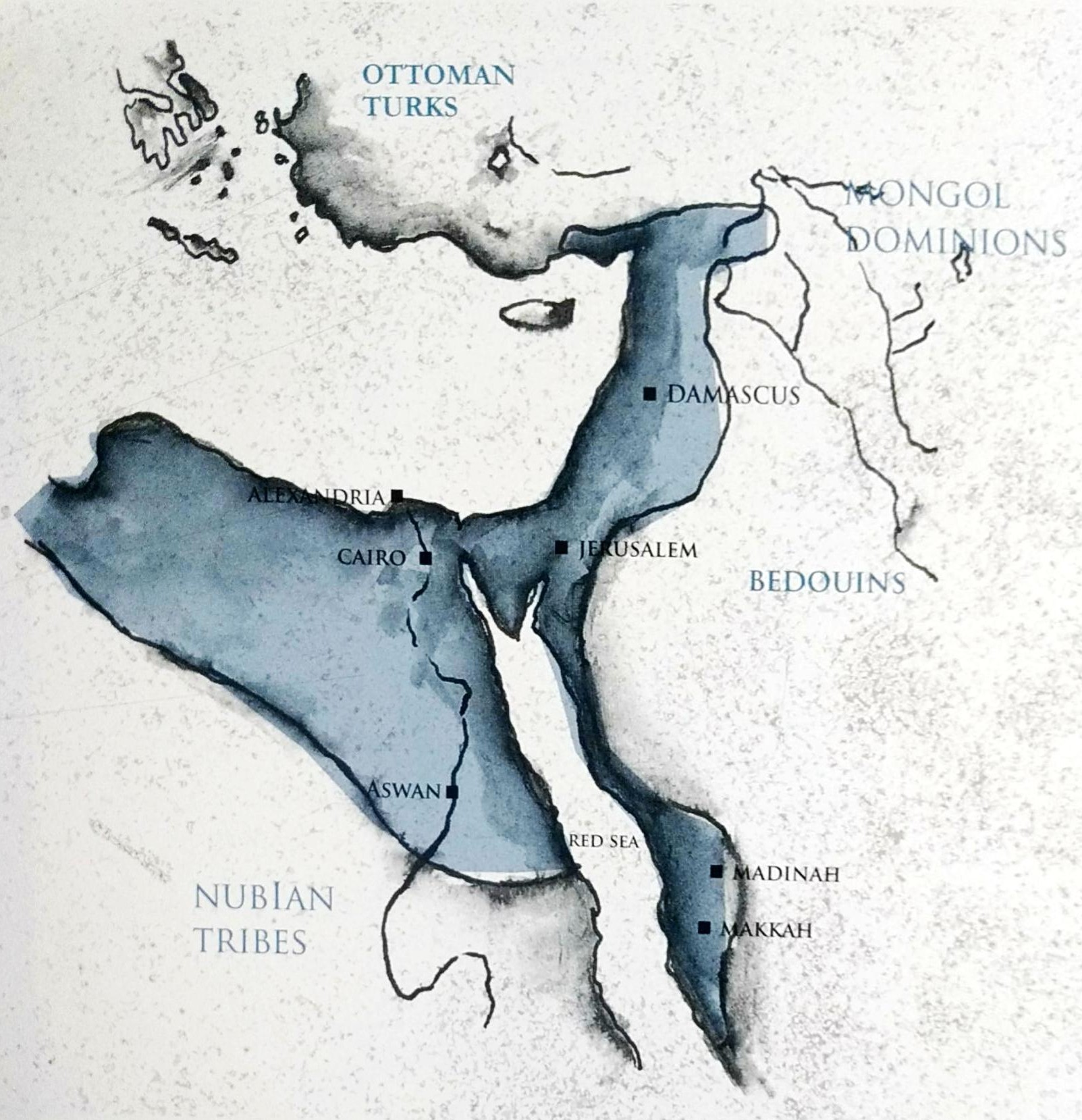
Exploitation of Slavery - India (1)
“The Mughals pressed further down into southern India than any preceding Muslim dynasty, flooding Inner Asia with Hindu captives.”
“Muslims in Sri Lanka and parts of India establised an upper limit of forty concubines per man ...”
[Islam & the Abolition of Slavery by William G.C. Smith, Page 8 & 80]
“... the powerful Mughal realm to the north, which was nearly alone among major Muslim states of the era in not employing large numbers of slave soldiers.”
[Slavery & Islam by Jonathan A.C. Brown, Page 144]
Exploitation of Slavery - India (2)
“The great emperor Akbar (r. 1556-1605) ... forbade the enslavement of women and children in war in 1562 ... prohibited the enslavement of non-Muslim subjects in arrears on their taxes ... He freed thousands of slaves in his own household in 1582 ... He also banned the sale of slaves in public markets ... He may have kept his concubines after 1582, and he authorised slave trading in areas affected by severe famine.”
“There was a return to older patterns after Akhtar’s death, although not all was lost ... Jahangir himself prohibited castration in 1608 ... Awrangzib ... did not prevent the importation of servile eunuchs ... the Shii Nawabs of Awadh (Oudh) employed eunuchs, bought young girls from poor parents, and enslaved tax defaulter.”
[Islam & the Abolition of Slavery by William G.C. Smith, Page 90-91]
Exploitation of Slavery - Africa
“Islam did not eliminate enslavement for debt in Africa ...”
[Islam & the Abolition of Slavery by William G.C. Smith, Page 77]
“The Shariah clearly prohibited enslaving non-Muslim subjects living under a Muslim ruler (dhimmis). But they were also occasionally enslaved, as Muslim slave raiders did with Christians in Nubia who had been granted dhimmi status in the Mamluk Empire in 1276 CE ...”
[Slavery & Islam by Jonathan A.C. Brown, Page 106]
Exploitation of Slavery - Rest of the World
“... Ibn Battuta reported a fourteenth century trade in indebted women in the entirely Muslim Maldive Islands.”
“However, Iranian Safavid rulers imposed castration as a punishment, gelding a man for homosexuality.”
[Islam & the Abolition of Slavery by William G.C. Smith, Page 77 & 82]
“In the mid-1500s, a jurist ... for Ibrahim Adil Shah (d. 1558), ruler of the princely state of Bijapur ... that parents could sell their children into slavery when impelled by hunger.”
[Slavery & Islam by Jonathan A.C. Brown, Page 211]
Case of Slaves from non-Muslim Lands (1)
“Abu M. Juwayni (d. 1047) ... scholar of Shafi law ... stated that it was best to avoid buying slave girls who had been taken via raiding into non-Muslim territory since the proper procedures for taking in and distributing spoils were regularly ignored.”
“... Imam Nawawi (d. 1277) and other scholars ... proved that in the Shafi school the khums tax must be paid on all spoils.”
“... path of pious caution would be to avoid buying any slave girl who might have been seized or stolen by raiders.”
[Slavery & Islam by J. Brown, Page 89]
“... when the Ottoman prince (and convert to Shafiism from his native Hanafi school) Shehzade Korkud (d. 1513) wrote a sizable book on the topic ... concluding that many of the slaves being bought and sold in his time were not actually legally ownable.”
“But slaves seem to have complained frequently to Shariah courts, and judges responded to them.”
[Slavery & Islam by J. Brown, Page 90]
Allah will be the Opponent of Three
عَنْ أَبِي هُرَيْرَةَ ـ رضى الله عنه ـ عَنِ النَّبِيِّ صلى الله عليه وسلم قَالَ « قَالَ اللَّهُ تَعَالَى ثَلاَثَةٌ أَنَا خَصْمُهُمْ يَوْمَ الْقِيَامَةِ رَجُلٌ أَعْطَى بِي ثُمَّ غَدَرَ، وَرَجُلٌ بَاعَ حُرًّا فَأَكَلَ ثَمَنَهُ، وَرَجُلٌ اسْتَأْجَرَ أَجِيرًا فَاسْتَوْفَى مِنْهُ وَلَمْ يُعْطِهِ أَجْرَهُ »
Narrated by Abu Hurairah (r.a) that the Prophet (s.a.w) said, “Allah said, ‘I will be an opponent to three types of people on the Day of Resurrection. One who makes a covenant in My Name, but proves treacherous. One who sells a free person and eats his price. One who employs a labourer and takes full work from him but does not pay him for his labour.’”
[Sahih Bukhari, Kitab Al-Ijarah (37), Hadith 2270]
Case of Slaves from non-Muslim Lands (2)
“From 1492 the Ottomans demanded proof that imported slaves were POWs, but such documents were issued for a fee, in effect becoming an import duty.”
“Many Georgian slaves from the Caucasus, including members of the clergy, were victims of civil wars ...”
“Ibn Taymiyya permitted ... purchase debt slaves from infidels who had no covenant with Muslims. Christian Georgian lords handed over serfs for payment, while Armenians sold children in times of need.”
[Islam & the Abolition of Slavery, 33]
“Sidi Al-Arabi Burdalah issed a fatwa in Fez around 1708 ... ‘evidence must establish beyond a shadow of doubt that a person is originally slave ...’”
“Dealers in slaves suffered from a generally poor reputation.”
[Islam & the Abolition of Slavery, 34]
“... Hanafis during this period suggested that Muslims concerned with avoiding sin should not purchase any such slaves ...”
[Slavery & Islam by J. Brown, Page 211]
Why didn’t the Slaves ever Revolt or Rebel?
“... the early Christian theologian Gregory of Nyssa (d. 394 CE). This Church Father of Cappadocia wrote a passionate plea against enslaving humans ...”
[Slavery & Islam by Jonathan A.C. Brown, Page 188]
“Two slave risings broke out in southern Iraq in the seventh century, a small one around 689-690, and a more serious one in 694-695 ... Ali bin Muhammad, leader of southern Iraq's third and much larger Zanj rebellion of 869 to 883 ... claimed himself to be the Mahdi, inscribing the title on all his surviving coins.”
“Some 500 Black slaves, employed to care for horses near Cairo, rebelled in 1146. They briefly set up their own state ...”
[Islam & the Abolition of Slavery by William G.C. Smith, Page 63 & 64]
Atlantic Slave Trade
“Segment of the global slave trade that transported between 10 million and 12 million enslaved Africans across the Atlantic Ocean to the Americas from the 16th to the 19th century ... An estimated 10 to 15 percent of the captives died on their way to the coast.”
[Encyclopaedia Britannica, Transatlantic Slave Trade]
West’s Human Zoos
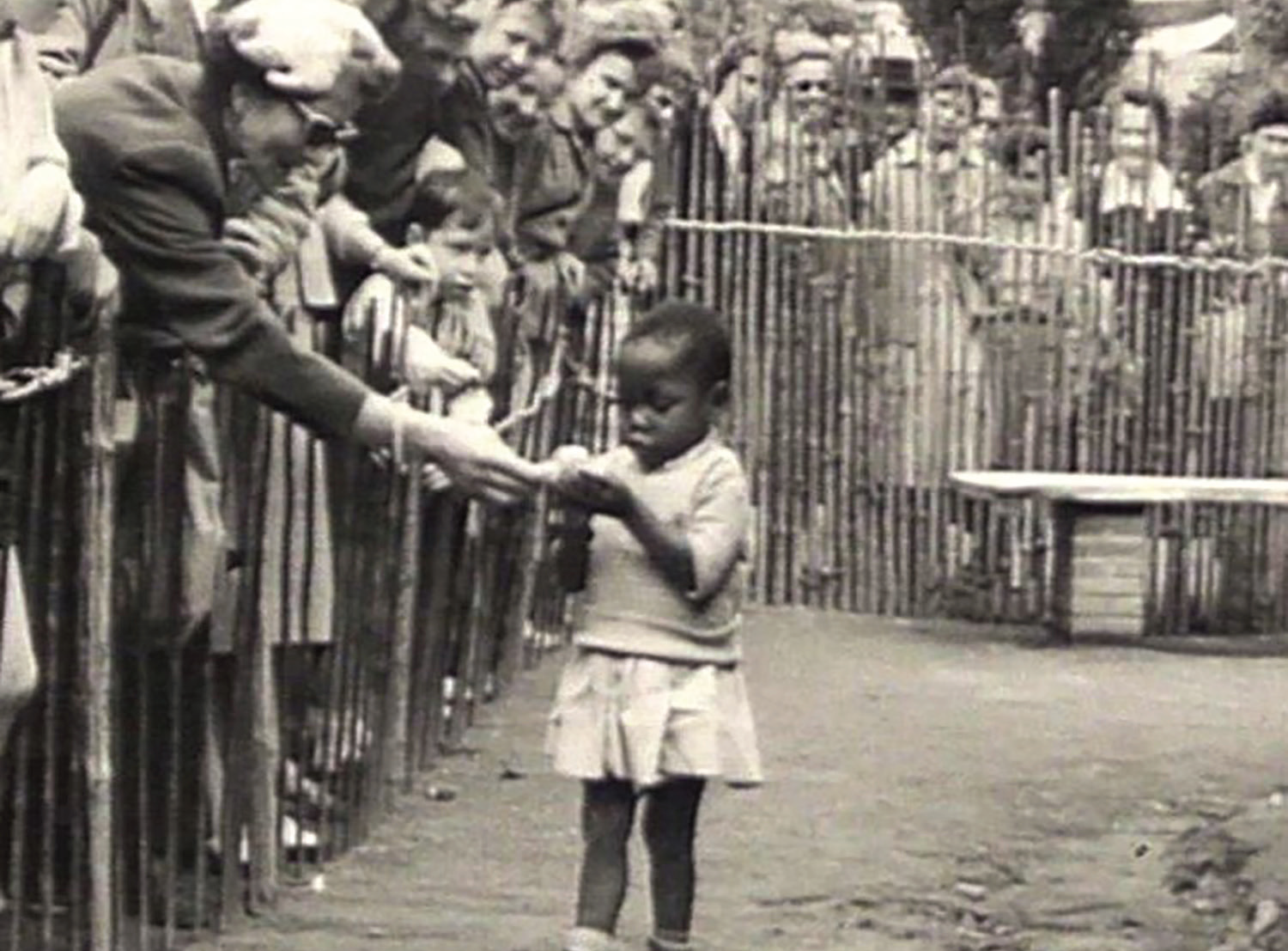
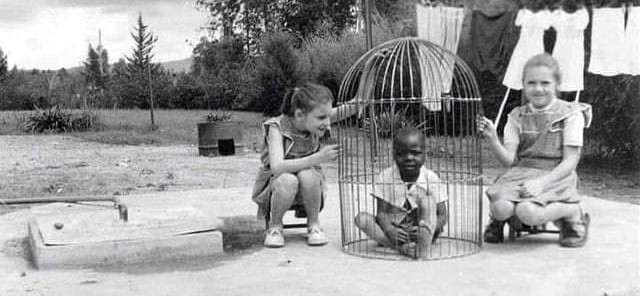
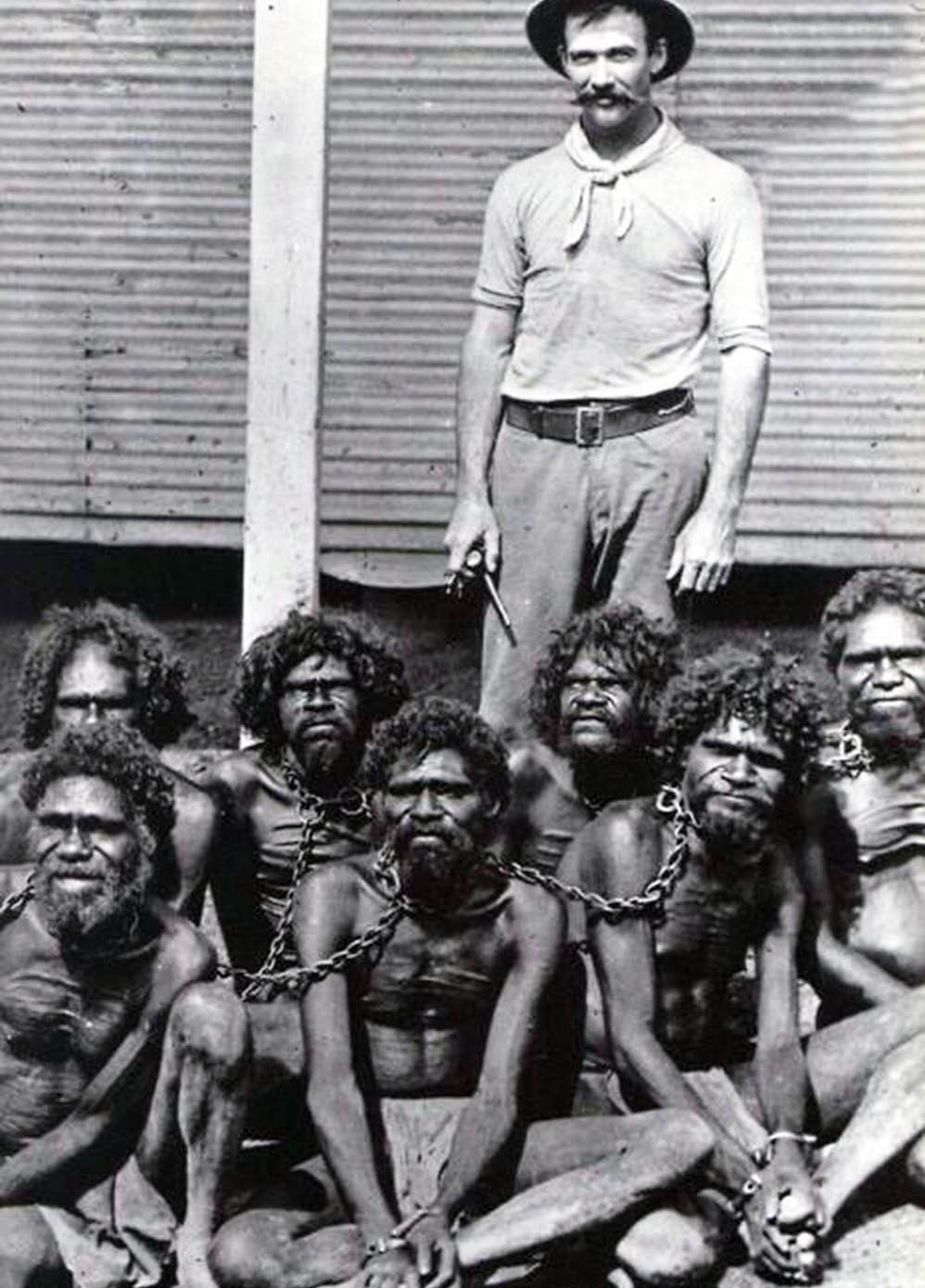
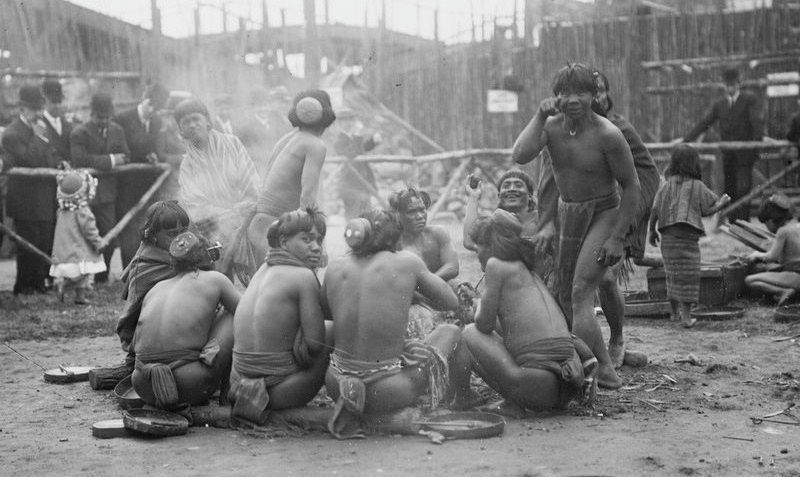
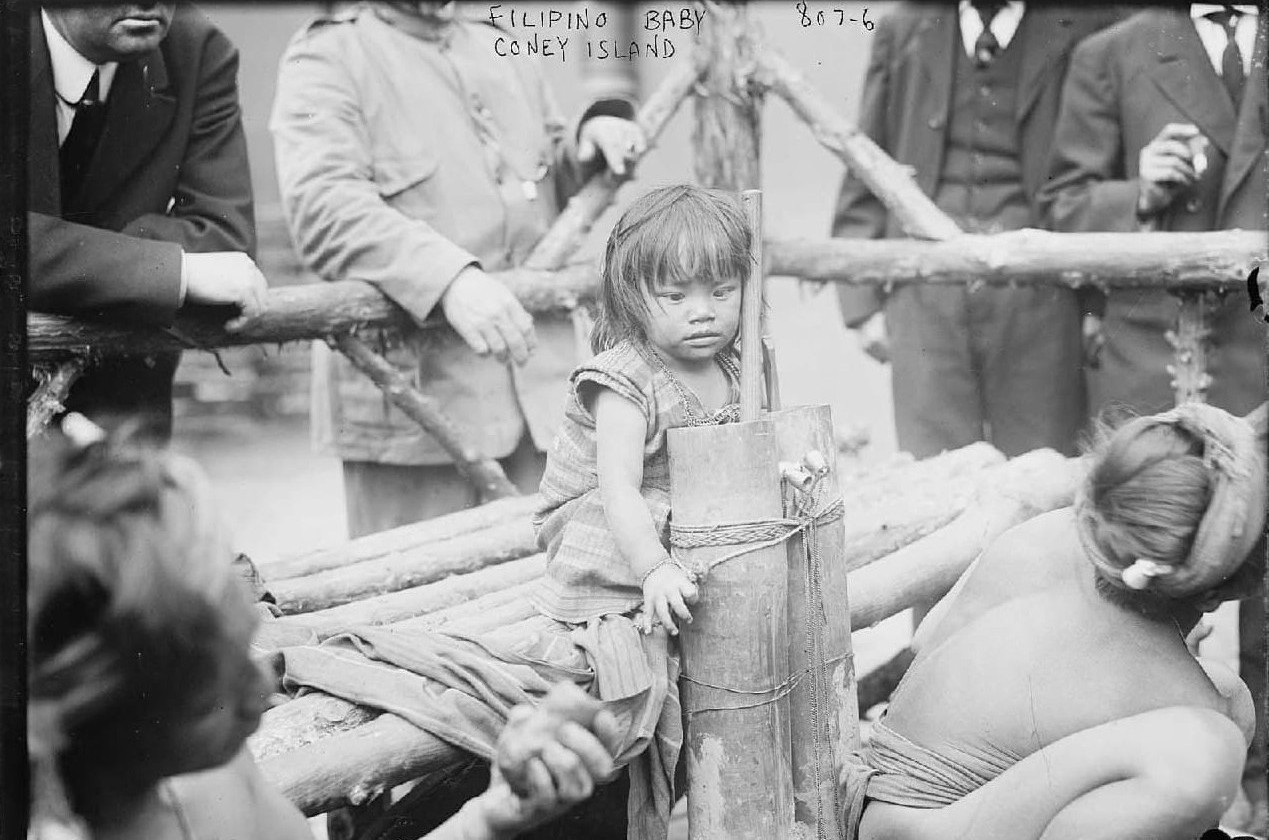
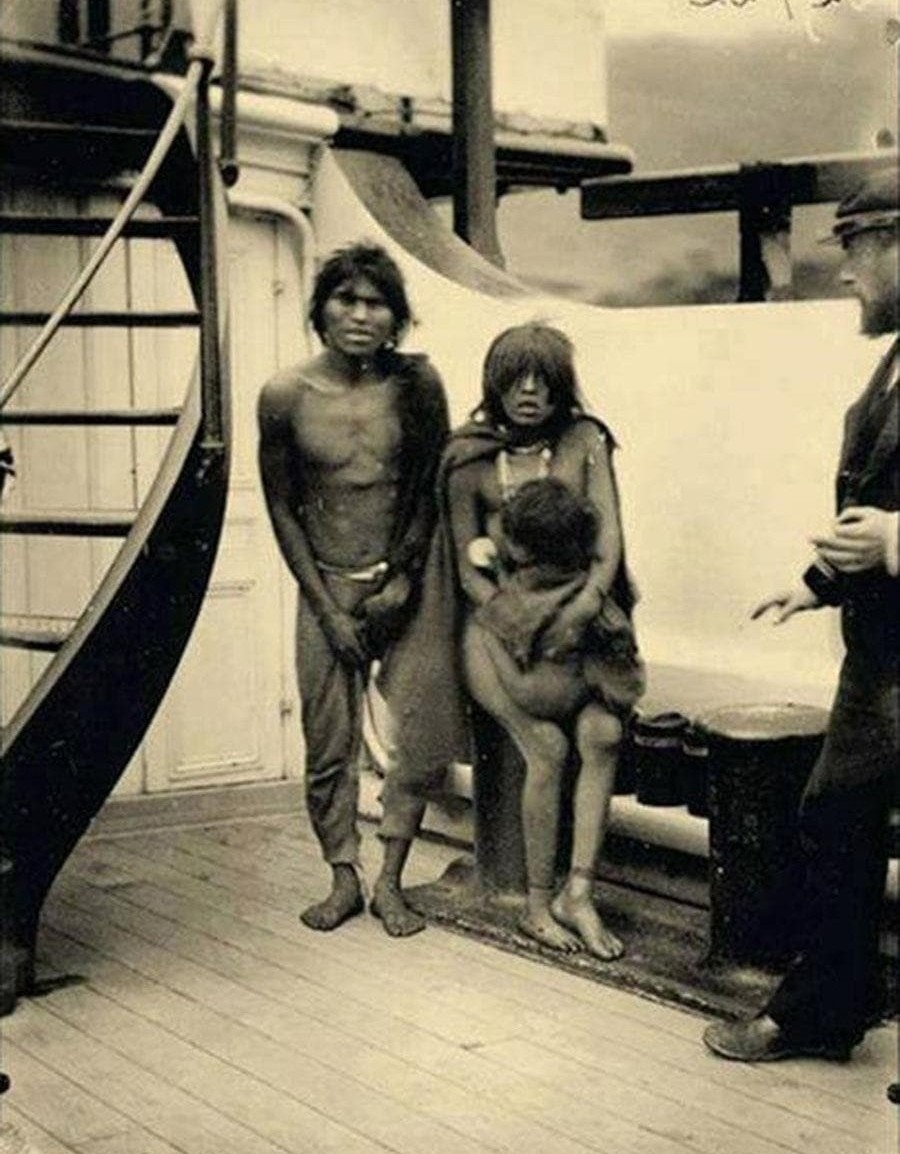

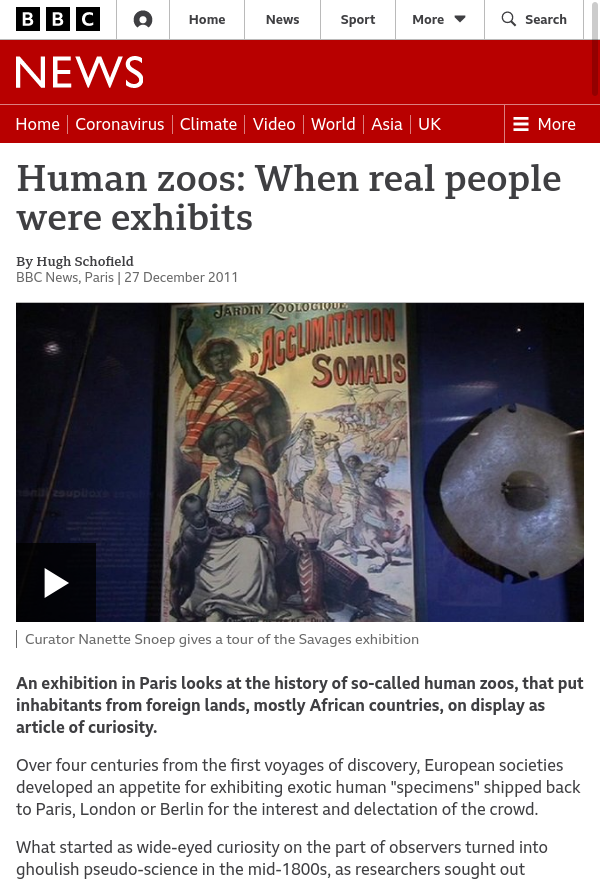
The Society for the Abolition of the Slave Trade formed in London (1787)
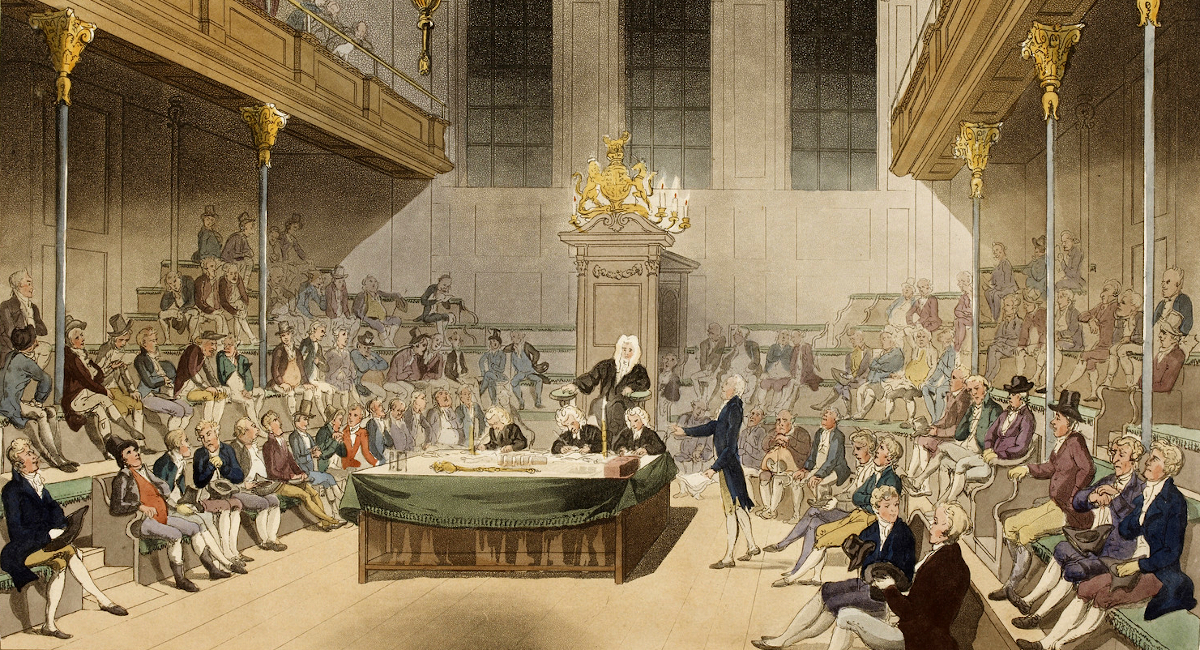
But the First Step had Already Been Taken
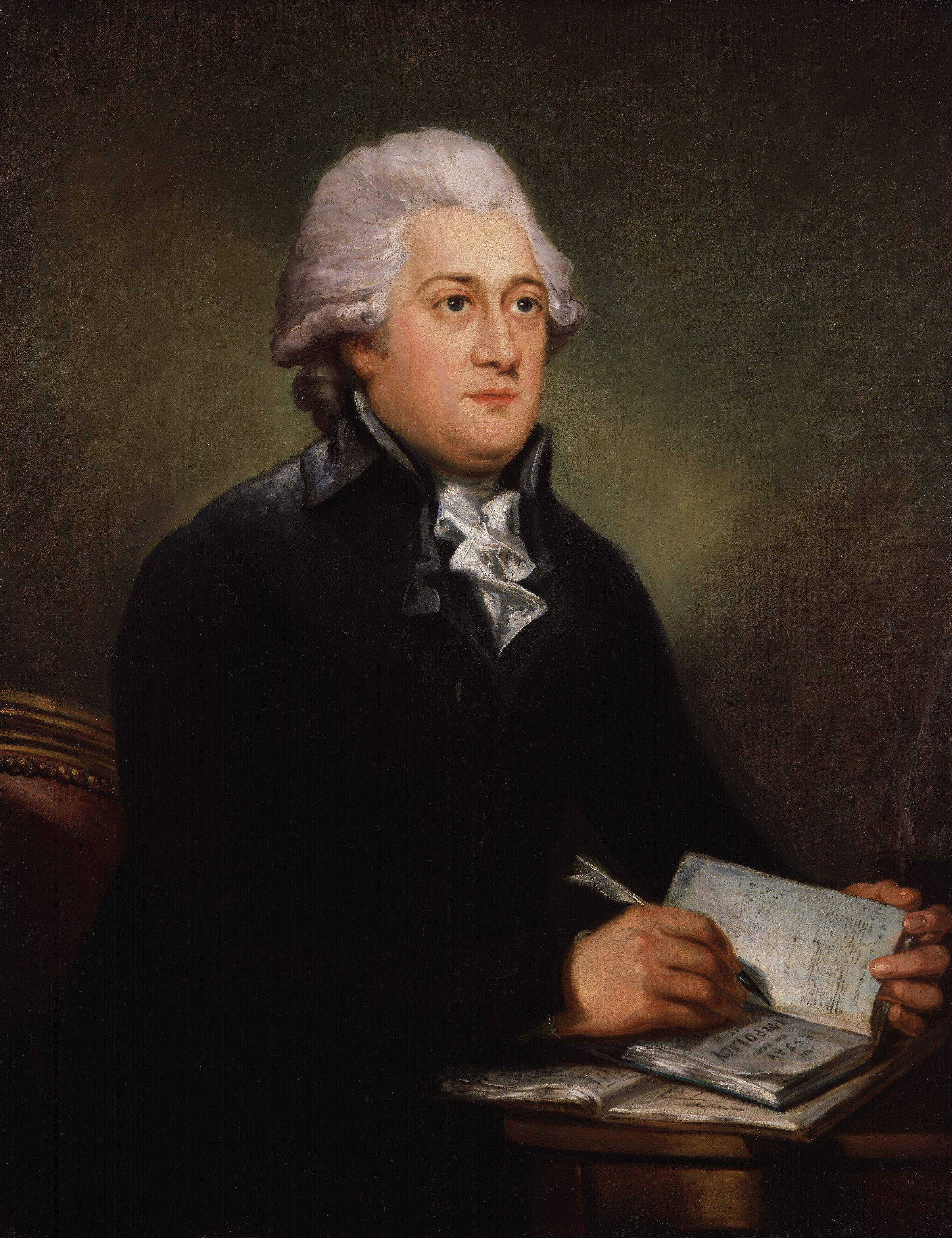
“Evidence suggests that in 1787, when the Society for the Abolition of the Slave Trade held its first meeting in London to discuss how to gradually end the trade, the Almaami Abdul Qadir Kan had already abolished it in Senegambia ... he (Thomas Clarkson) wrote publicly of the Almaami Abdul Qadir, proclaiming him as a role model for the Christian kings of Europe.”
[The Walking Quran by Rudolph T. Ware, 114-115]
First to End Slavery
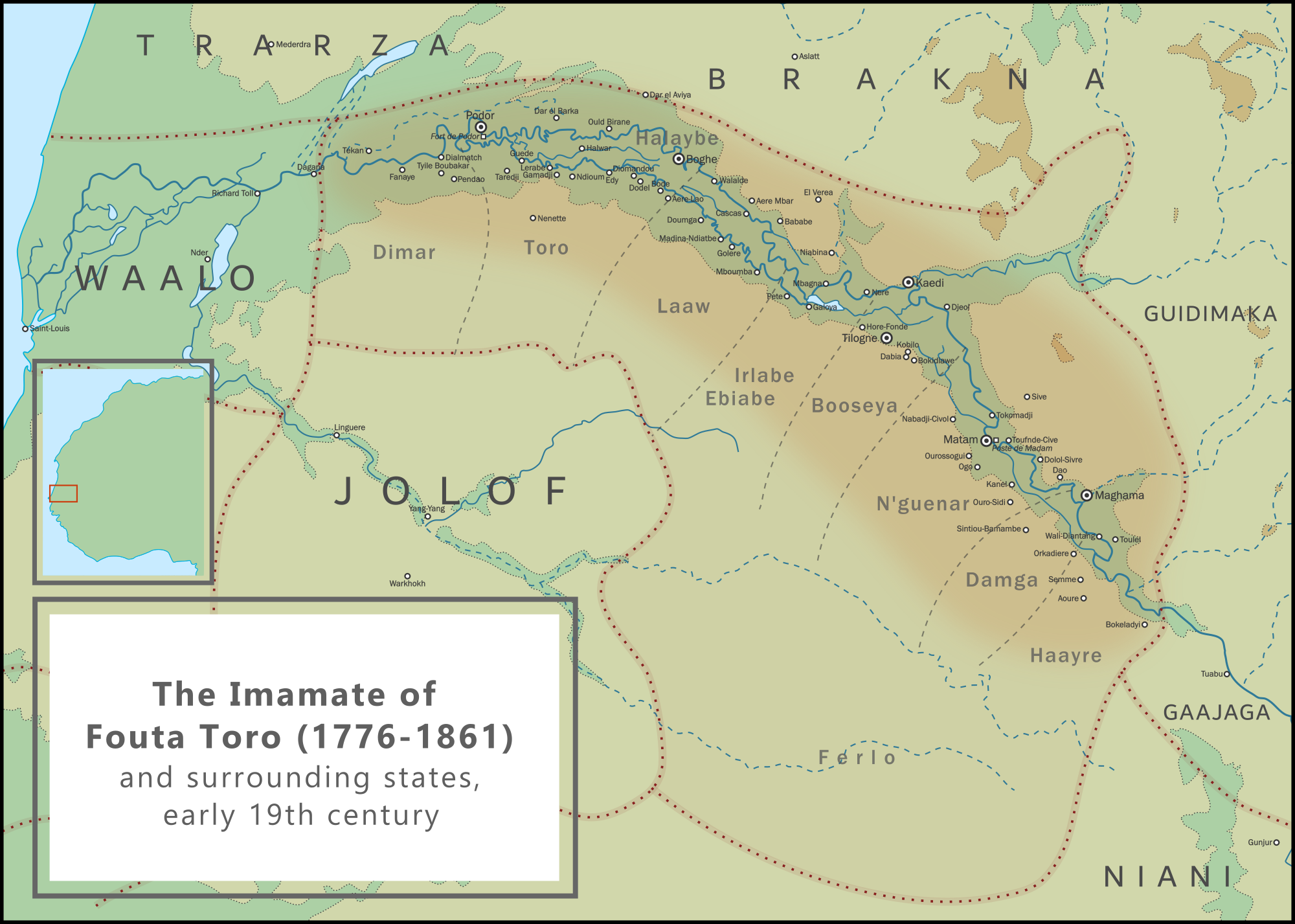
“The numbers of Muslims being sent into Atlantic and Saharan slavery ... was unprecedented, and slaving kings had murdered and enslaved countless Walking Quran ...”
“Abdul Qadir Kan was a Quran teacher and a specialist in Maliki law.”
“Clarkson specified ... abolished the slave trade in his own country ... refused Europeans passage either overland or along the Senegal River in their efforts to acquire slaves further inland ... European merchants responded with bribes ... But he sent them all back ... the Almaami abolished not only the trade but slavery itself ...”
[The Walking Quran by Rudolph T. Ware, 114-117]
“... European powers simply aided rival local potentates with the money and weapons needed to overthrow the imamate.”
[Slavery & Islam by J. Brown, Page 209]
“Baron Roger’s novel, Keledor (1828) ... ‘... no new slaves into the country, and that every former slave who could read a passage from the Quran would immediately gain his freedom.’”
[The Walking Quran by Rudolph T. Ware, 117]
“The British did not abolish the slave trade for another twenty years.”
[The Walking Quran by Rudolph T. Ware, 114]
“The Imamate of Fuuta Tooro did effectively end slavery in Senegambia (roughly modern Senegal, Gambia, Mali, Mauritania and Guinea) for a time, but only the enslavement of Muslims.”
[Slavery & Islam by J. Brown, Page 213]
Timeline of Abolition & Muslim World (1)
- 1787
- Imamate of Fuuta Toro prohibits European traders from trading in Muslim slaves.
- 1789
- British East India Company prohibits import, export and the internal slave trade in India, with only moderate effect.
- 1803
- Denmark abolishes slave trade.
- 1807
- British Abolition Act prohibits slave trade for British subjects.
- 1815
- At Congress of Vienna, France, Britain, Russia, Prussia, Austria and Spain condemn slave trade.
Economic Factors Behind Abolition (1)
“In 1724, the Russia czar abolished slavery and converted all of Russia's slaves into serfs because serfs were offering themselves as slaves to avoid paying taxes; serfs paid taxes, slaves did not.”
[Slavery & Islam by Jonathan A.C. Brown, Page 56]
“Productive servitude suddenly declined again in the Islamic world from the 1880s. The cost of coerced labour rose, just as free labour became more readily available and commodity prices stagnated.”
[Islam & the Abolition of Slavery by William G.C. Smith, Page 11]
Economic Factors Behind Abolition (2)
“The status of many slaves in the Ottoman Empire in the eighteenth and nineteenth centuries, for example, did not differ much from their contemporaries working as free wage laborers in Britain.”
“... slavery had disappeared in France due to economic reasons ... Britain’s rate of economic growth in the eighteenth century was astounding ...”
“... key to later consumer capitalism: that free workers paid wages would be more productive than unpaid slaves and that their participation in the economy would drive growth ... new technologies enabled socities to break from their millennia-old reliance on human and animal labor.”
[Slavery & Islam by Jonathan A.C. Brown, Page 167 & 190]
The Impact of European Renaissance
“A belief that history was progressing in a positive direction was unknown prior to the Renaissance of Europe. The classical Greco-Roman view was cyclical, and the Abrahamic view was that it was headed downhill after the preeminent moment of contact with the Logos (in Christ or the Quran).”
[Slavery & Islam by Jonathan A.C. Brown, Page 189]
Muslim Efforts to End Slavery - Africa (1)
“When the British consul approached ... in 1841 and asked him to take measures against the slave trade ... that he would end slavery in Tunis altogether ... affirmed by both the senior mufti of the Hanafi school ... and the Maliki ...”
“In January 1846 ... ordered the emancipation of all slaves in the territory and declared that, from that time on, all people born in Tunis would be born free. He offered no compensation to the slave owners.”
[Slavery & Islam by J. Brown, Page 228 & 227]
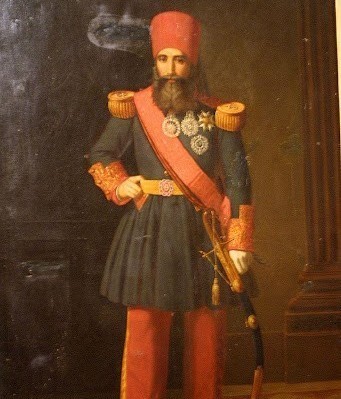
Muslim Efforts to End Slavery - Africa (2)
“It provided the justification for the Ottoman sultan's shuttering the Istanbul slavery market in 1847 ...”
“It was highlighted almost two decades later in 1863, when one of Ahmad Bey's successors as governor, Husayn Pasha (d. 1890), wrote to the American consul in Tunis discussing how slavery had ended there and urging Americans to follow suit.”
[Slavery & Islam by J. Brown, Page 231 & 230]
“A British ethnographer’s description of the conditions of Black slaves in Istanbul in the 1860s ... most were freed and left to beg in the streets.”
[Slavery & Islam by J. Brown, Page 127]
Timeline of Abolition & Muslim World (2)
- 1865
- US makes slavery illegal with the 13th Amendment.
- 1897
- Sultan of Zanzibar abolishes slave status.
- 1922
- Morocco bans internal slave trade. Completely banned in 1956.
- 1924
- Turkish Republic bans slavery.
- 1929
- Shah abolishes slavery in Persia.
- 1962
- Saudi Arabia prohibits slavery.
- 1981
- Mauritania becomes last country to abolish slavery.
Asking Muslims to Understand Islam
“Christian Snouck Hurgronje, the great Dutch Islamist, remarked in 1886 that ‘slavery would disappear, if even Islam could draw near to its own ideals.’ Later he noted that ‘according to Mohammedan principles, slavery is an institution destined to disappear ... [and is not] indispensable to the integrity of Islam’.”
“Bertram Thomas stated badly in the 1930s that, ‘in the unabatement of slavery, Arabia has been false to her Prophet’.”
[Islam & the Abolition of Slavery by William G.C. Smith, Page 18]
Iqbal on Slavery in Islam
“... That slaves had equal opportunity with other Muhammadans is evidenced by the fact that some of the greatest Muslim warriors, kings, premiers, scholars and jurists were slaves. During the days of the early Caliphs slavery by purchase was quite unknown; part of public revenue was set apart for purposes of manumission, and prisoners of war were either freely dismissed or freed on the payment of ransom ... The Prophet’s own treatment of slaves was extraordinarily liberal ... The truth is that the institution of slavery is a mere name in Islam ...”
[Speech: Islam as a Moral and Political Ideal, Anjuman Himayat-i-Islam in 1909]
How Muslims Justified the Ban on Slavery
“The Tunisian master Maliki scholar Ibn Ashur, who as a young man had met and admired Abduh, ... when asked if a Muslim government could ban polygamy. ‘The ruler can prohibit the people from doing this permitted act ... due to the existence of some harm in it. And Islamic history is full of examples showing this ...’ It was also cited - again, on the question of slavery - by ... Muhammad Taqi Usmani.”
[Slavery & Islam by J. Brown, Page 227]
“It was the primary justification for King Faysal’s 1962 decree prohibiting slavery in Saudi Arabia.”
[Slavery & Islam by J. Brown, Page 231]
“... Yusuf Qaradawi affirms Usmani’s conclusion ... Qaradawi argues fervently that abiding by the international agreements and rules of warfare is clearly in the best interests of Muslims and Islam.”
[Slavery & Islam by J. Brown, Page 236]
Support from the Quran
يَا أَيُّهَا الَّذِينَ آمَنُوا أَطِيعُوا اللَّهَ وَأَطِيعُوا الرَّسُولَ وَأُولِي الْأَمْرِ مِنكُمْ ۖ فَإِن تَنَازَعْتُمْ فِي شَيْءٍ فَرُدُّوهُ إِلَى اللَّهِ وَالرَّسُولِ ... ۞
“O you who believe, obey Allah, the Messenger and those in authority among you. And if you disagree over anything, refer it to Allah and the Messenger ...”
[Surah An-Nisa (4): Ayat 59]
يَا أَيُّهَا الَّذِينَ آمَنُوا أَوْفُوا بِالْعُقُودِ ... ۞
“O you who have believed, fulfill [all] contracts ...”
[Surah Al-Maida (5): Ayat 1]
The Fraud of ‘War On Terror’
“The fact that even earlier states like the Ottoman Empire had not only not enslaved Yazidis but freed them when they were wrongfully taken ...”
[Slavery & Islam by Jonathan A.C. Brown, Page 261]

Email: MAhmadZ@pm.me
YouTube: @MAhmadZ
Twitter: @MAhmadZ
Telegram: @MAhmadZ
Soundcloud: @MAhmadZ
LinkedIn: @MAhmadZ
For the full video & other beneficial topics, visit:

YouTube: @MAhmadZ
Twitter: @MAhmadZ
Telegram: @MAhmadZ
Soundcloud: @MAhmadZ
LinkedIn: @MAhmadZ
Email: MAhmadZ@pm.me